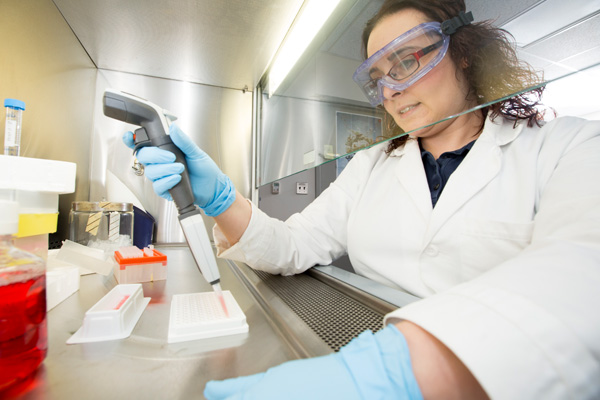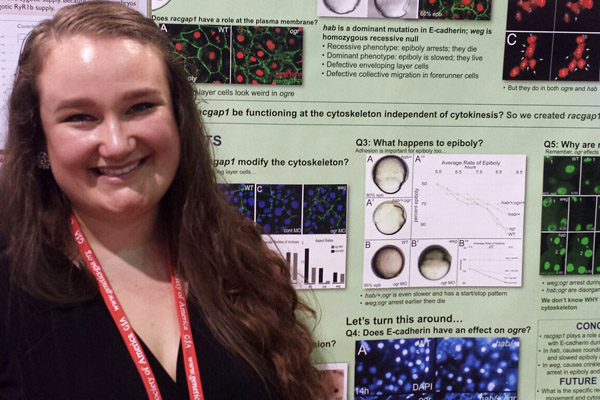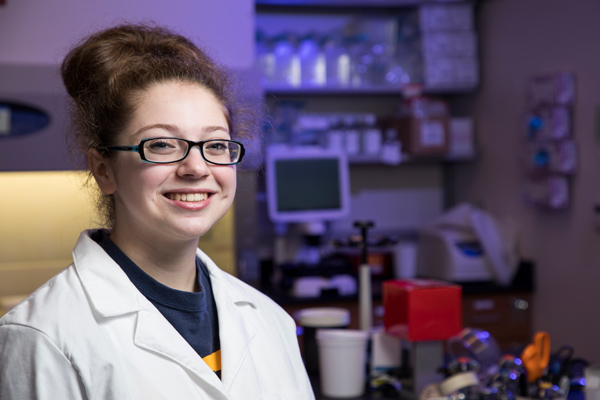Donor Gift Ensures Future UM-Flint Chemistry Research

Jessica Kelts, PhD, associate professor in UM-Flint Chemistry and Biochemistry, is known for her research with human cells. She's also known for the ways in which she involves her undergraduate students in hands-on research. Last year, she received the happy news that her work would have unprecedented support from the Ben F. Bryer Foundation—allowing her to continue making important contributions to her field while giving UM-Flint students life-changing experiences.
"I'm so proud that we can celebrate the Bryer Foundation's generosity and the exceptional work it will help fund," said Dean Susan Gano-Phillips of UM-Flint's College of Arts and Sciences, home of the Chemistry and Biochemistry Department. "Ongoing support for faculty research not only strengthens the standing of UM-Flint in the research community, but also presents opportunities for faculty/student research collaborations which are so essential for students seeking employment or graduate study upon completion of their degree."
The Foundation's relationship with UM-Flint helps honor Dr. Ben F. Bryer's desire to pass on the gift of education and pursuit of medical knowledge to students studying medicine. Beginning in 2005 with an endowed scholarship fund for nursing students, additional gifts have been established to fund research, instrumentation, and a nursing simulation center. In 2016, the Foundation established the Ben F. Bryer Chemistry/Biochemistry Research Fellow Award at UM-Flint. The award was the first of its kind for the department, and will be transformational to the scope of Dr. Kelts' work and the opportunities available to students on her research team.
UM-Flint Chemistry's Legacy of Support
With the Bryer Research Fellow Award, Dr. Kelts will be finalizing her research project in which she studied the effects of Vitamin D on the use of a chemotherapeutic drug for a particular strain of breast cancer cells. Previous Bryer funds helped support the initial research, expanded lab space, and provided necessary equipment, including a cell culture incubator. Many students have been involved in the decade-long project, leading to national research conference presentations and publication with then-students Sarah (Richards) Webster and Kaytie Weierstahl in Anticancer Research, an international journal of cancer research and treatment.
Webster, who was an Honors Biochemistry and Human Biology major, just received her Master's degree in developmental genetics at Western Michigan University. Weierstahl, who majored in General and Molecular Biology, is now at the LECOM School of Pharmacy in Bradenton, Florida. Both credit their research experience with Dr. Kelts as being foundational to their current success.
"I cannot say enough how much more prepared I was than the average undergraduate research student after being in Dr. Kelts' lab. First, she has a great mentor style," said Webster. Noting that Dr. Kelts provides the foundation students need to begin their projects, and also leaves them room to discover solutions for themselves through trial and error. "This type of critical thinking, which the Department of Chemistry and Biochemistry is awesome at as well, was so beyond valuable. I was able to start in my research lab here at WMU, and get a paper out after my first year, which is generally unheard of.
"Second, getting to do hands-on research and be in charge of my own project taught me how to be better with my time management, organization skills, and how to interact with a professor in a research setting. All of these skills set me up for success."
Webster hopes that incoming students at UM-Flint will follow in her footsteps. "Doing undergraduate research is one of the most valuable things you can do," she noted. "And it's not because you get to put it on your resume; it can show you your strengths and weaknesses, where your true passions are found in science, and allow you to start thinking critically, which is a skill that, no matter what you end up doing in life, is an invaluable tool."

Kelts considers the time she spends with her students in the lab, and that which they spend there working independently, to be "an integral part of their education as chemists and biochemists." She also sees great value in their hands-on involvement creating opportunities to experience the excitement of making original breakthroughs in research.
"The research experience is where [students] can truly grow as scientists," Kelts added. "Students benefit from trying to solve questions that don't have known answers yet. This is exactly what they will be asked to do as a graduate student, as a research employee for a pharmaceutical or chemical company, and sometimes also as a medical, pharmacy, veterinary, or dental student."
The Bryer Research Fellow Award has also allowed Kelts to begin moving on to a new project working with adipocytes, or fat cells, and studying the effects of thyroid hormones on metabolism. "This second research project would not be possible without the gift from the Bryer family, because there is significant cost to its set up," noted Kelts.
"[This] study could shed light on the consequence of abnormal ratios of thyroid hormones in the body. This is relevant to those that have this imbalance, including those already diagnosed with hypo- or hyperthyroidism, and those that struggle with obesity, which is a risk factor for many types of cancer and other diseases. The focus on studies that could inform us about aspects of human health is in line with the mission of the Bryer Foundation." The project is already inspiring a new generation of student researchers.
The Future of Research in UM-Flint Chemistry
"I wanted to get involved with research because I know that, wherever I end up in the medical field, I want to not only help my patients by conducting research, but want to also be able to leave a long-lasting mark in the medical field," said Zack Clor, a biochemistry major who joined Dr. Kelts in her lab during his senior year.
"I knew working on research with Dr. Kelts would not only allow me to master the skills that I have learned thus far in both labs and lectures, but I'll also be able to use this to help build an understanding of major problems within today's communities and how biochemistry can be applied to help solve these problems."

"The University of Michigan-Flint has prepared me to achieve my goals," continued Clor. "Through the rigor of the curriculum [and] the opportunities that we have to work with research, the Flint campus has provided a great opportunity to achieve any goal a student wishes to accomplish.
"With the information that I have learned in class and the practical experience that I gain between my course labs and in our research lab," he added, "I will be prepared to be successful in the future." After graduation, Clor plans to attend medical school with the hope of becoming a physician.

Catherine Wilhelm, another current student researcher in Dr. Kelts' lab, was involved in the final stages of the breast cancer research project. She will also be involved in a future publication on their findings.
"Going into grad school with a background in research and a publication will definitely give me an edge," explained Wilhelm. "It's also helped me realize that I want to pursue research that can help improve the way we fight diseases."
The students are proud to help fulfill the Bryer Foundation mission of making education more accessible to those interested in pursing medical fields. "To the donors, I would like to say that the generous donations they make for the funding of research and scholarships is greatly appreciated," concluded Clor. "This money allows students to become involved more in the practical applications of the sciences and gain experience in how real research is conducted."
Related Posts
No related photos.
- Biology
- Chemistry & Biochemistry
- College of Arts, Sciences & Education
- Giving
- Research
- University News
UM-Flint News
The Office of Marketing & Communications can be reached at mac-flint@umich.edu.